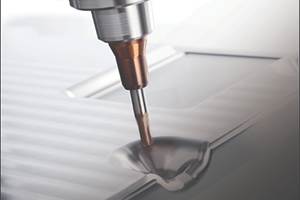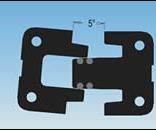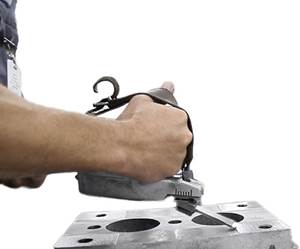Stratasys Unveils Spin-off Evolve Additive Solutions to Focus on New "STEP" Technology
Selective Thermoplastic Electrophotographic Process Technology (STEP) delivers the well-known advantages of additive manufacturing with cost-per-part and surface quality in line with traditional manufacturing, along with X, Y, Z directional strength and mechanical properties rivalling injection molding.
Stratasys Ltd. officially unveils a spin-off of its Selective Thermoplastic Electrophotographic Process (STEP) technology and forming of Evolve Additive Solutions.
After nearly 10 years as an incubation project, the new organization will be led by a dedicated management team, exclusively focused on bringing the proprietary STEP technology to market. This technology is aimed at delivering high-volume production additive manufacturing at breakthrough speeds compared to other commercially available additive processes.
Traditional manufacturers have long sought to combine the benefits of additive manufacturing with the material, quality and economics of traditional production processes. Built on Stratasys’ pioneering development and 3D printing and additive manufacturing expertise, Evolve’s STEP technology is aimed at producing parts at a cost, quality and throughput comparable to traditional manufacturing processes. The solution is intended for high-volume production runs into the hundreds of thousands per year. As such, it is expected to compete with traditional processes, such as injection molding.
“As an independent company, Evolve will best be able to focus on the advancement of the technology, provide the entrepreneurial environment and management equity incentives suitable for early stage efforts and drive the customer relationships and partnerships to foster further development and initial market adoption,” Stratasys CEOIlan Levin says. “As an equity stakeholder, we look forward to collaborating with Evolve and supporting this initiative to help make it a success.”
Designed for automated manufacturing and factory-floor integration, STEP empowers users to utilize production-grade thermoplastics for volume production applications across multiple industries, including Consumer, Automotive, Industrial and Medical. The highly scalable and extensible solution combines Evolve’s own proprietary technology with the proven capability of electrophotographic imaging.
“We are excited to introduce Evolve Additive Solutions and proprietary STEP technology,” Steve Chillscyzn, CEO of Evolve Additive Solutions and co-inventor of STEP says. “We believe the STEP Technology is uniquely positioned to bridge the gap in the market not yet addressed by additive or traditional manufacturing technologies.”
“STEP is the first-of-its-kind technology offering an additive method for mass production. It’s designed to deliver the benefits of additive, while handling high-volume production. And we’re confident in the Evolve team’s ability to make this technology a success,” Chillscyzn says.
The STEP process combines time-tested 2D imaging technology with proprietary IP developed by Evolve to precisely align incoming layers and sophisticated bonding techniques that create final parts that are fully dense with isotropic properties of injection molding.
Specifically, STEP technology introduces a range of new features, including:
- Engineering-grade thermoplastic materials (amorphous and semi-crystalline)
- Production speeds of up to 50X faster than existing additive manufacturing solutions
- Cost per part and surface quality comparable to traditional manufacturing
- Isotropic properties in X, Y and Z directions on par with injection molding
- Industry 4.0 and automation factory floor integration
- Multiple material printing capable within the same layer
- Full color printing capability – including spot and process.
Evolve has already commenced seeking initial purchase orders from several leading automotive, consumer goods and aerospace companies during its alpha stage. Over the next 12 months, Evolve also plans to engage new customers to evaluate beta systems for applications in volume production environments across many vertical markets. Parties interested in beta opportunities are encouraged to contact Evolve directly. Evolve has not yet announced the date of expected general availability of its products.
STEP technology is aimed at delivering high-volume production additive manufacturing at breakthrough speeds compared to other commercially available additive processes.
Industry Consultant Todd Grimm comments, “Evolve’s STEP process is interesting because it brings a completely new approach to production environments using additive manufacturing, yet it prints using production grade thermoplastics, which is what manufacturers are most familiar with when producing parts conventionally. Having had the opportunity to get a glimpse early on, it’s very encouraging to see how Evolve has progressed the development of the STEP process.”
The seasoned senior management team of Evolve Additive Solutions brings over 40 years of combined experience in additive manufacturing and includes such industry leaders as:
- Steve Chillscyzn, Chief Executive Officer
- Bruce Bradshaw, Chief Business & Marketing Officer
- Shane Glenn, Chief Financial & Strategy Officer
- Dr. Arun Chowdry, Vice President of Technology and Materials
Related Content
Treatment and Disposal of Used Metalworking Fluids
With greater emphasis on fluid longevity and fluid recycling, it is important to remember that water-based metalworking fluids are “consumable” and have a finite life.
Read MoreMoldmakers Deserve a Total Production Solution
Stability, spindle speed and software are essential consideration for your moldmaking machine tool.
Read MoreSolving Mold Alignment Problems with the Right Alignment Lock
Correct alignment lock selection can reduce maintenance costs and molding downtime, as well as increase part quality over the mold’s entire life.
Read MoreThe Benefits of Hand Scraping
Accuracy and flatness are two benefits of hand scraping that help improve machine loop stiffness, workpiece surface finish and component geometry.
Read MoreRead Next
How to Use Continuing Education to Remain Competitive in Moldmaking
Continued training helps moldmakers make tooling decisions and properly use the latest cutting tool to efficiently machine high-quality molds.
Read MoreAre You a Moldmaker Considering 3D Printing? Consider the 3D Printing Workshop at NPE2024
Presentations will cover 3D printing for mold tooling, material innovation, product development, bridge production and full-scale, high-volume additive manufacturing.
Read MoreReasons to Use Fiber Lasers for Mold Cleaning
Fiber lasers offer a simplicity, speed, control and portability, minimizing mold cleaning risks.
Read More











_300x250 1.png;maxWidth=300;quality=90)













